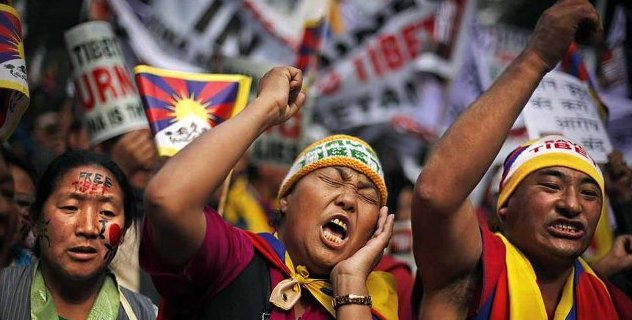
Exiled Tibetans during a four-day campaign in New Delhi, India, on 30 January 2013, to draw global intervention to end China’s repressive rule in Tibet/Photo/Altaf Qadri/Associated Press
There is no religious freedom in Tibet
By Ashish Yechury | Feb 3, 2013, [The Times of India]
Lobsang Sangay, head of the Tibetan government-in-exile in Dharamshala, was in Delhi recently for the Tibetan solidarity campaign. The former Harvard academic spoke to Ashish Yechury about the wave of self-immolations in Tibet which have left as many as 99 Buddhist monks dead.The last time there was a dialogue between the Tibetans and the Chinese authorities, there was some agreement about the Tibetan Autonomous Region. But then the talks broke down. What happened?
The last time we engaged the Chinese was in January 2010. The talks broke down because when we proposed genuine autonomy for Tibetans, the Chinese did not consider it. There is a document called memorandum of genuine autonomy but the Chinese government did not agree with that. They did not propose or agree with anything. Instead, they offered criticism. They saw our definition of autonomy as hidden independence. But whatever we listed in the memorandum corresponds to provisions of the Chinese constitution about Tibet. We asked them to implement that but they refused.
You do not want to break with China?
We are not challenging China’s sovereignty or territorial integrity. We seek genuine autonomy within the People’s Republic of China. That they refused.
How do you propose to engage with the Chinese meaningfully?
At the moment there is no engagement. We are willing so it is dependent on them. We are waiting for them to reciprocate. We are waiting for Xi Jinping to take over in March to see how the Chinese respond to our offer.
Over the last 50 years, China has changed and become more moderate with changing leadership . How do you see this change?
China has changed only for the Han Chinese. If you want to see moderation in China, Tibet is the catalyst. If you want to see moderate China for the rest of the world, Tibet is the test. If they change their policy for Tibet, it would be the first time they would do so for non-Hans , and that will go a long way. What we seek is moderation in China where they accept diversity. They should accept Tibetans as equals.
China has become more open to religion. It is funding monasteries and restoration of Buddhist monuments?
The funding and restoration is for tourist purposes. The monasteries are funded if they stay “patriotic” . Practising religion is another matter. In all the 7,000-odd monasteries they have, democratic management committees of Chinese Communist Party members control recruitment and disciplining of monks. They throw you out if you disagree. What kind of freedom is that? In practice there is no religious freedom. That is why most of the self-immolators are monks.
How do you see the transition in the Chinese leadership?
Let’s wait for the transition to happen. Given our past experience with the Chinese, we’re not optimistic, but we remain hopeful.
You stress on India and the international community having an important role in resolving the issue of Tibet. What do you expect them to do?
We want the international community to pressure China through the UN to open up Tibet to international observers so what is happening in Tibet can come out. China has always made Tibet a core issue in all its negotiations so India should do so too in its dialogue with China.
What is the four-day programme in New Delhi all about?
The programme is part of “solidarity with Tibet” campaign that we launched on March 10, 2012, which was also the world human rights day. A major event was organized in New York and now in January it is happening in New Delhi. February 10 is Tibetan New Year and we have given a call to not celebrate it this year in solidarity with Tibetans inside Tibet who died — 99 people have immolated themselves. On March 10, we have a major event planned in Brussels in front of the European parliament. The year 2013 is going to be devoted to our “solidarity with Tibet” campaign.
Do Tibetans in exile have anything to do with self-immolations in Tibet?
No. We discourage drastic action including self-immolation . But we support the aspiration of the return of the Dalai Lama to Tibet and freedom for Tibetans. http://tibet.net/2013/02/03/there-is-no-religious-freedom-in-tibet/